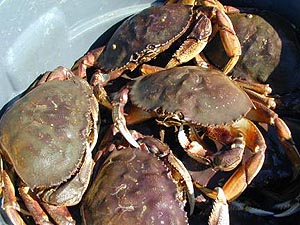PORT ANGELES — Eating a lot of crab from Port Angeles Harbor could increase the risk of cancer, according to 13-year-old research presented to the Clallam County Board of Health on Tuesday.
The report issued in February 2005 stems from samples taken in 2002 mostly off the old Rayonier mill site, a firmer pulp mill that became a cleanup site in 2000.
In 2007, a health warning against eating crab or shellfish from the harbor was issued.
The Lower Elwha Klallam tribe sought an update on the warning, but neither the state departments of Ecology nor Health had funds to take new samples or evaluate them, according to Amy Leang, health department toxicologist.
The report drew these conclusions:
■ Lifetime excess cancer risk (increased chance of getting cancer) from eating crab muscle: 3 persons per 10,000 people from arsenic and other contaminants.
Lifetime excess risks were based on a person’s eating 0.39 pound of uncooked meat of seafood a day.
■ Lifetime excess cancer risk from eating crab hepatopancreas, known as “crab butter”: 1 in 100 from arsenic, PCBs, dioxin and DDT.
Leang advised people not to eat crab butter — in which contaminants can become concentrated — at all.
■ For members of the Lower Elwha Klallam tribe, who consume more seafood than nontribal people, the lifetime excess cancer risk rises to 1 in 1,000 from crab muscle, 4 in 100 from crab butter.
The report noted no evidence that tribal members consume seafood harvested exclusively from the harbor.
There was little cancer risk for people eating coonstripe shrimp — 1 in 100,000 for nontribal members, 8 in 100,000 for tribal members.
As for mussels, cancer risk likewise was similarly low, but Leang said sewage pollution in the harbor made eating any shellfish — mussels, clams and oysters — unsafe.
The Department of Health also said eating more than four meals a month from seafood harvested from Port Angeles Harbor could increase a person’s risk of developing non-cancer health problems — including intestinal distress from ingesting copper and immune-system disorders from PCBs — from these persistent chemicals found in the harbor.
The department defines a meal as 8 ounces of uncooked seafood — a half-pound –—for adults, a portion roughly the size and thickness of your hand, including thumb and fingers. A child’s meal is 4 ounces.
For more information about choosing, preparing and eating seafood, visit www.doh.wa.gov/fish.
For the full Department of Health report on the harbor, see http://tinyurl.com/PDN-harborstudy.
_______
Reporter James Casey can be reached at 360-452-2345, ext. 5074, or at jcasey@peninsuladailynews.com.

